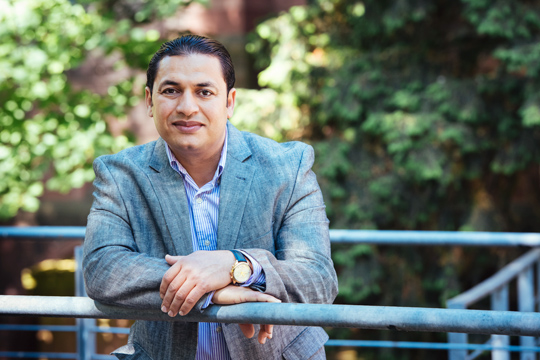Boundless melodiousness
Freiburg, Jul 09, 2018
If you have ever ordered a cup of coffee in German, you already know a few words of Arabic. Terms such as coffee (qahwa) and cup (ṭāsa) originally come from the Arabic-speaking world. About 350 million people speak Arabic worldwide – it is considered the mother tongue in 22 countries and is one of the six official United Nations languages. In a series about seldom-learned languages, Christine Hohlbaum talked with the lecturer Ashraf Attia about the advantages and the possible misunderstandings of Arabic.
 Ashraf Attia received a degree in Islamic studies in Cairo before obtaining a second degree at the University of Freiburg. The native Egyptian has been teaching Arabic at the Language Teaching Centre since 2006. Photo: Klaus Polkowski
Ashraf Attia received a degree in Islamic studies in Cairo before obtaining a second degree at the University of Freiburg. The native Egyptian has been teaching Arabic at the Language Teaching Centre since 2006. Photo: Klaus Polkowski
Mr. Attia, why is Arabic considered one of the seldom-learned languages?
Ashraf Attia: That used to be the case – but over the past five years there has been increasing interest in Arabic at the University of Freiburg. Not only Islamic scholars learn the language, but also, for instance, people from the medical field. A lot of doctors have recently been volunteering to assist refugees. It helps a lot if you have the Arabic language at your disposal to communicate. The recent trend at the Language Teaching Centre is to offer two beginner and intermediate courses per semester.
What are some of the reasons people should learn Arabic?
Apart from the fact that Arabic is the official language in 22 countries, there are up to 1.7 billion Muslims worldwide who are exposed to the language through the Quran. Andreas Unger’s book Von Algebra bis Zucker points to many Arabisms in the German language.
The word “algorithm,” for instance, stems from the name of the Persian mathematician
al-Khwarizmi who wrote the numeral system in Arabic.
Which Arabic expression should everyone learn?
“Salāmu ’alaikum” means “peace be with you.” When saying good-bye, you use the term “Salām” or also “ma’a s-salāma.” It is the most important concept in the world because we can only live together when there is peace.
What is your favorite word?
Arabic is a boundless language that places a strong emphasis on melody. It transmits emotions, almost like poetry. The word “eye” (’ain) has many meanings, for instance: eye, water source, spy, the thing itself, gold or silver. It depends greatly on the context.
What “false friend” should people look out for in Arabic?
We don’t really have false friends in that sense, but we can certainly have the wrong idea. It is really funny in the beginning to learn how to tell time. For instance, when people say “half-past four”, an Arab thinks mathematically so it means “two o’clock”, which is half of four.
Which Arabic expression do you miss in German?
It is more a question of semantics. The word “to have” is almost never used in Arabic. We use prepositions instead because we define possession differently. We see things more as a person’s guide. For example, “’indī Bait” means “The house is next to me” or “ma’ī Kitāb” literally means “The book is with me.” Every object is viewed in Arabic as a God-given thing. Formulating it in this fashion shows humility. If you would say you have a house, it would sound very arrogant in Arabic.
Which Arabic word best describes the University of Freiburg and what does it mean?
“Ǧāmi’” means “university” in Arabic, a gathering place of people with various backgrounds or a gathering place as a meeting point for many fields of study and disciplines. The female form “Ǧāmi’” actually means mosque. The first universities in the Arabic-speaking world originated from mosques in which people were given religious instruction.
Language Teaching Centre
The Language Teaching Centre (SLI) at the University of Freiburg offers courses in more than 20 languages that are open to all students, staff and University guests along with the general public.
Course offerings and registration

